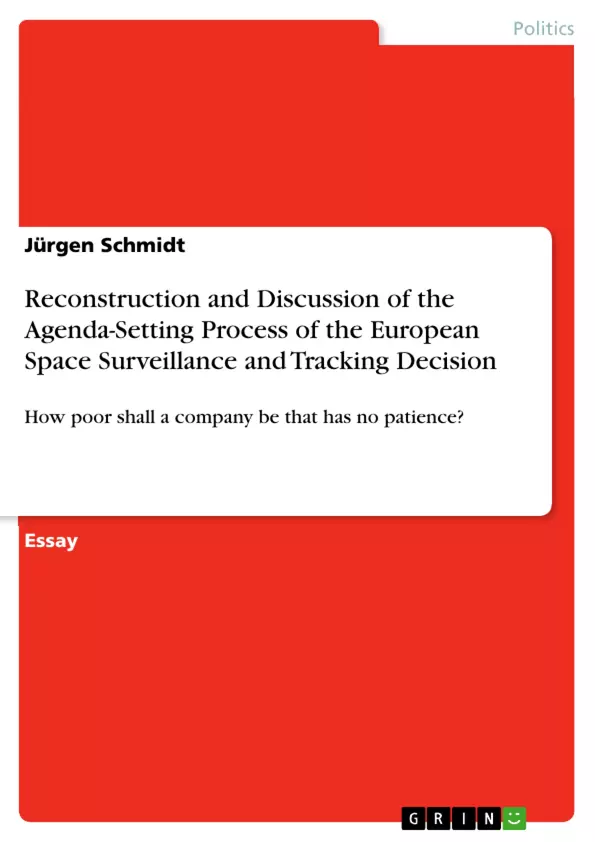Inhaltsverzeichnis (Table of Contents)
- Introduction
- Development of the problem of space junk (Problem Stream)
- manifestation of Industries Interests in Lobbyism and Influencing of the Agenda Setting Process (Solution Stream)
- Theoretical Perspective
- Conclusion
Zielsetzung und Themenschwerpunkte (Objectives and Key Themes)
This paper examines the agenda-setting process of the European Space Surveillance and Tracking (SST) decision, spanning from 2007 to 2014. It aims to shed light on the role of different actors in the process, including the European Parliament, Council, Commission, and various interest groups. The analysis seeks to understand why the issue of space junk became a priority for the EU, and what factors influenced the decision to develop a European SST.
- The growing problem of space debris and its potential impact on satellite operations.
- The role of lobbying and interest groups in shaping the policy agenda.
- The influence of economic liberalization on EU policy decisions.
- The significance of the agenda-setting process in policy evaluation and shaping.
- The future implications for the commercial use of space in Europe.
Zusammenfassung der Kapitel (Chapter Summaries)
The introduction establishes the context of the paper, outlining the growing threat posed by space debris and the development of the US SST system. It highlights the need for a European SST and the potential economic implications of space junk for the satellite industry.
Chapter 2 focuses on the "Problem Stream" of the agenda-setting process, examining the increasing amount of space debris and its causes. The chapter analyzes data on the number of rocket launches and space debris accumulation, suggesting that collisions between debris are a major contributor to the problem. This chapter also explores the link between investor confidence in the satellite industry and the prevalence of space debris.
Schlüsselwörter (Keywords)
Space junk, European Space Surveillance and Tracking (SST), agenda setting, lobbying, interest groups, economic liberalization, institutional bias, policy evaluation, commercial use of space, satellite industry.
Frequently Asked Questions
What is the European SST decision?
The Space Surveillance and Tracking (SST) decision refers to the EU's initiative to develop a system for monitoring space debris to protect satellite infrastructure.
Why did space junk become a priority for the EU?
The increasing accumulation of debris poses a collision risk that threatens satellite operations, investor confidence, and the commercial use of space.
What is the "Problem Stream" in this context?
The Problem Stream analyzes the technical and environmental manifestation of space debris, including data on rocket launches and collision risks.
What role did lobbying play in the SST decision?
Interest groups and industries influenced the agenda-setting process through lobbying to ensure their economic interests in the satellite industry were protected.
Which period does the analysis cover?
The paper reconstructs the agenda-setting process spanning from 2007 to 2014.
- Quote paper
- Jürgen Schmidt (Author), 2015, Reconstruction and Discussion of the Agenda-Setting Process of the European Space Surveillance and Tracking Decision, Munich, GRIN Verlag, https://www.grin.com/document/356895



